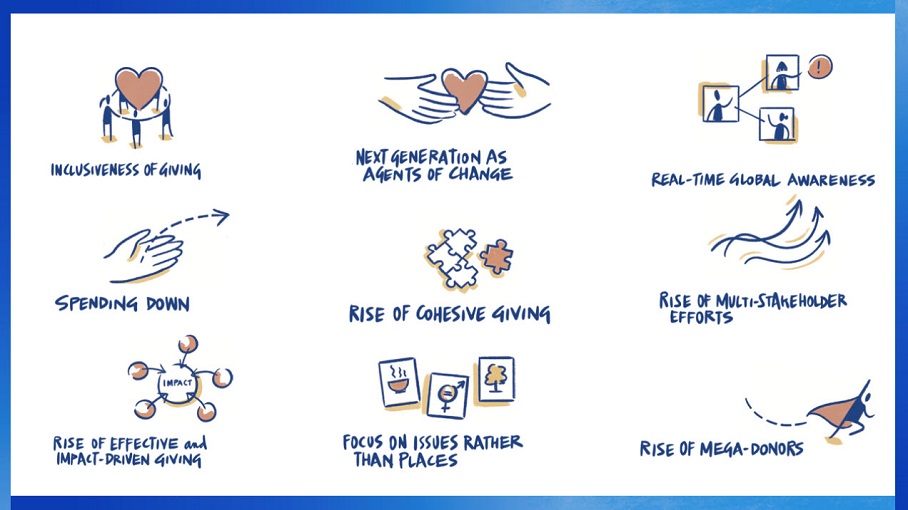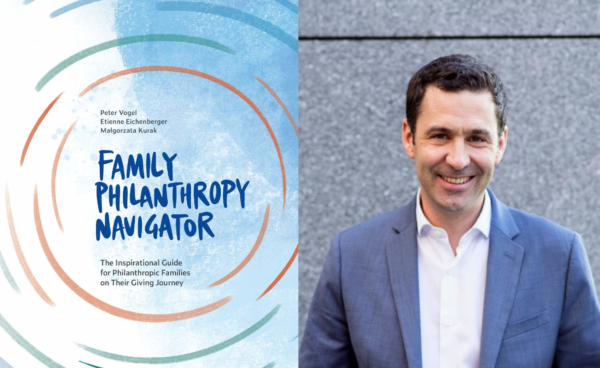The Family Philanthropy Navigator by Peter Vogel, Etienne Eichenberger and Malgorzata Kurak, published in December 2020, is an inspirational guide for new and existing philanthropic families to initiate or enhance their journeys in giving. As familial philanthropy plays an important role in transnational giving, the TGE team interviewed one of its three authors, Etienne Eichenberger, to learn more about the journey that led to the publication of the book and to discover its findings. President of our Swiss TGE Partner Swiss Philanthropic Foundation and co-founder and WISE‘s managing partner, Mr. Eichenberger is is an expert in high-impact philanthropy.
TGE : What motivated you to write this book? How did the idea of this collaboration emerge?
Mr. Eichenberger: Family philanthropy is on the raise. In fact, many important foundations were founded by enterprising families, and many of them are still led by their descendants. At the same time, we see a trend that philanthropists want to give more in their lifetime, and they have greater ambitions in terms of achieving a significant impact with their giving. However, as many things in life that are important but not urgent, philanthropy is an “inner journey” before it becomes a structured process. The Family Philanthropy Navigator is a best-in-class tool to help you design a rewarding and effective journey in giving, and to inspire families of all kinds to give and to give well The process suggested within our book is both simple and powerful.
TGE : What are the key teachings or messages you would like to highlight from this book?
Mr. Eichenberger: We created the Family Philanthropy Navigator as an inspirational guide for aspiring and experienced philanthropic families on their giving journey. It provides families from various walks of life with real case studies, challenging questions, and engaging activities. The core message is that giving is a process that can be very enjoyable but, at the same time, it can be very challenging. Recommendations and learnings from peers, as we present in the book, can come in handy to novice and more seasoned philanthropists. We are strongly convinced – that is, myself and my co-authors Peter Vogel and Malgorzata Kurak – those certain moments of the giving family’s journey require much more attention and care than other. Briefly, these four key moments which might be equally important for many families are: 1) younger generation willing to become more involved, 2) senior generation withdrawing from the governance of family philanthropy, 3) philanthropy becoming more institutionalized within the family enterprise system, or finally 4) family creating a foundation or a sheltered fund.
TGE : Did you meet with any surprising findings as you researched and wrote this book?
Mr. Eichenberger: The book is not so much of a research with surprises and findings than an endeavour to cross-fertilize the insight of research and teaching led by IMD in Lausanne and our experiences as advisors primarily at WISE-philanthropy advisors, and indirectly with the Swiss Philanthropy Foundation that I chair. However, if I need to stress one element to your question, it is the feedback from the readers. In fact, we constantly hear that the book might be “the next best thing” as Filiz Bikmen stated it recently in a review on Alliance Magazine. Our choice to have Alfredo Carlo, an Italian design thinker from day 1 to shape the book to facilitate its access is very much welcome. The book is not meant to be read from A to Z but to be used from time to time to find practical insights on one of the 8 key sections.
TGE : What is the best advice you can give to organisations (umbrella foundations or fundraisers) looking to engage with family philanthropy? How can they improve their advisory services or strategy to meet the needs of family philanthropy?

Mr. Eichenberger: In my experience, every philanthropy advisor – and I count myself and my colleagues at WISE in this group too – has a bias. Based on a collective intelligence process in the writing journey, and years of experiences working with families, we have come to the conclusion that some questions are more relevant than order to build an agile approach for your family. For example, when working with an umbrella foundation, we tend to focus on the “how” of getting organised and “what” of the relevant structure. While this is all may be the most intuitive thing to do, while working with actual donors, I have realized that the notion of relationships (“who” and “with whom”) as much as the motivation (“why”) are many times crucial to ensuring impactful family giving. The Family Philanthropy Navigator highlights the eight questions which, we believe, each philanthropist should address as he or she embraces on the joined family philanthropic journey.
TGE : Based on your long-standing relationship with the Transnational Giving Europe network and experience as a philanthropy advisory, what do you think is the intersection between family philanthropy and cross-border giving today? How well is European/international giving integrated within family philanthropy strategy?
Mr. Eichenberger: TGE is an amazing network, and I have only praise to give to your work in this field. In our book specifically, I see that many successful families are spread around the world in different geographies. For example, a family that we at WISE we work with is originally from Geneva, and this is where the mother is still based. However, one of their children is studying in London, while the other one is living and working in Spain. I could give multiple examples like this. To me, cross-border giving means as well giving in Europe or globally with an aim to bring, those spread over the entire world, families closer together.
TGE : Have you seen or do you foresee any impacts of the Covid-19 health crisis on family philanthropy?
Mr. Eichenberger: When I was a child, my father used to tell me that in life one has two important days: today and tomorrow. Covid-19 has shown us that prevention is less costly than reacting to a crisis that, ultimately, will have unpredictable consequences. So, today’s action does matter. In fact, while philanthropy is important for families, I see that too often it is getting postponed for day after tomorrow. But one can great rewards by starting today to contribute for a a less fragile tomorrow.
Want to learn more about Family philanthropy and buy the book? Click here : https://www.imd.org/research-knowledge/books/family-philanthropy-navigator/
